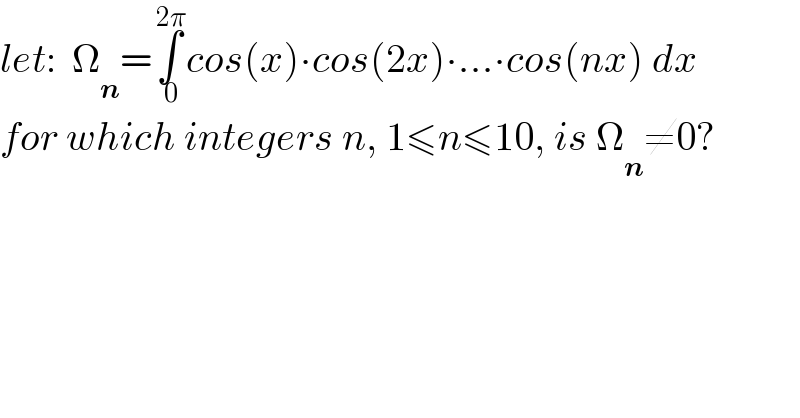Question Number 139474 by mathdanisur last updated on 27/Apr/21

$${let}:\:\:\Omega_{\boldsymbol{{n}}} =\underset{\:\mathrm{0}} {\overset{\:\mathrm{2}\pi} {\int}}{cos}\left({x}\right)\centerdot{cos}\left(\mathrm{2}{x}\right)\centerdot…\centerdot{cos}\left({nx}\right)\:{dx} \\ $$$${for}\:{which}\:{integers}\:{n},\:\mathrm{1}\leqslant{n}\leqslant\mathrm{10},\:{is}\:\Omega_{\boldsymbol{{n}}} \neq\mathrm{0}? \\ $$
Answered by mathmax by abdo last updated on 28/Apr/21

$$\Phi_{\mathrm{n}} =\int_{\mathrm{0}} ^{\pi} \:\mathrm{cosx}.\mathrm{cos}\left(\mathrm{2x}\right)….\mathrm{cos}\left(\mathrm{nx}\right)\mathrm{dx}\:+\int_{\pi} ^{\mathrm{2}\pi} \:\mathrm{cosx}\:\mathrm{cos}\left(\mathrm{2x}\right)….\mathrm{cos}\left(\mathrm{nx}\right)\mathrm{dx} \\ $$$$\left(\rightarrow\mathrm{x}=\pi+\mathrm{t}\right)\:=\int_{\mathrm{0}} ^{\pi} \:\mathrm{cosx}.\mathrm{cos}\left(\mathrm{2x}\right)…\mathrm{cos}\left(\mathrm{nx}\right)\mathrm{dx}+\int_{\mathrm{0}} ^{\pi} \mathrm{cos}\left(\pi+\mathrm{t}\right).\mathrm{cos}\left(\pi+\mathrm{2t}\right)…\mathrm{cos}\left(\mathrm{n}\pi+\mathrm{nt}\right)\mathrm{dt} \\ $$$$=\int_{\mathrm{0}} ^{\pi} \:\prod_{\mathrm{k}=\mathrm{1}} ^{\mathrm{n}} \:\mathrm{cos}\left(\mathrm{kx}\right)\mathrm{dx}\:+\int_{\mathrm{0}} ^{\pi} \:\prod_{\mathrm{k}=\mathrm{1}} ^{\mathrm{n}} \:\mathrm{cos}\left(\mathrm{k}\pi\:+\mathrm{kx}\right)\mathrm{dx} \\ $$$$=\int_{\mathrm{0}} ^{\pi} \:\prod_{\mathrm{k}=\mathrm{1}} ^{\mathrm{n}} \:\mathrm{cos}\left(\mathrm{kx}\right)\mathrm{dx}+\int_{\mathrm{0}} ^{\pi} \:\prod_{\mathrm{k}=\mathrm{1}} ^{\mathrm{n}} \:\left(−\mathrm{1}\right)^{\mathrm{k}} \:\mathrm{cos}\left(\mathrm{kx}\right)\mathrm{dx} \\ $$$$=\int_{\mathrm{0}} ^{\pi} \:\prod_{\mathrm{k}=\mathrm{1}} ^{\mathrm{n}} \:\mathrm{cos}\left(\mathrm{kx}\right)\mathrm{dx}\:+\left(−\mathrm{1}\right)^{\frac{\mathrm{n}\left(\mathrm{n}+\mathrm{1}\right)}{\mathrm{2}}} \:\int_{\mathrm{0}} ^{\pi} \:\prod_{\mathrm{k}=\mathrm{1}} ^{\mathrm{n}} \:\mathrm{cos}\left(\mathrm{kx}\right)\mathrm{dx} \\ $$$$=\left(\mathrm{1}+\left(−\mathrm{1}\right)^{\frac{\mathrm{n}\left(\mathrm{n}+\mathrm{1}\right)}{\mathrm{2}}} \right)\int_{\mathrm{0}} ^{\pi} \:\prod_{\mathrm{k}=\mathrm{1}} ^{\mathrm{n}} \:\mathrm{cos}\left(\mathrm{kx}\right)\mathrm{dx}\:\mathrm{so}\:\Phi_{\mathrm{n}} \neq\mathrm{0}\:\Rightarrow \\ $$$$\mathrm{1}+\left(−\mathrm{1}\right)^{\frac{\mathrm{n}\left(\mathrm{n}+\mathrm{1}\right)}{\mathrm{2}}} \:\neq\mathrm{0}\:\mathrm{and}\:\int_{\mathrm{0}} ^{\pi} \mathrm{cos}\left(\mathrm{x}\right).\mathrm{cos}\left(\mathrm{2x}\right)…\mathrm{cos}\left(\mathrm{nx}\right)\mathrm{dx}\:\neq\mathrm{0} \\ $$$$….\mathrm{be}\:\mathrm{continued}… \\ $$
Commented by mathdanisur last updated on 30/Apr/21

$${thanks}\:{sir} \\ $$
